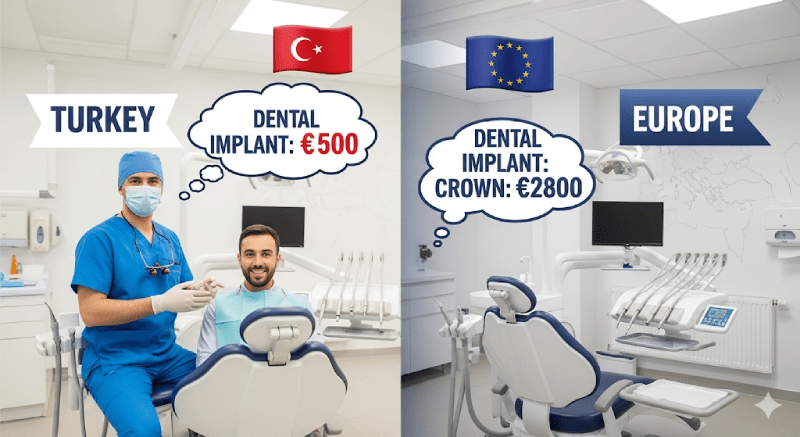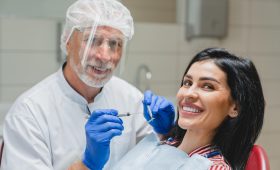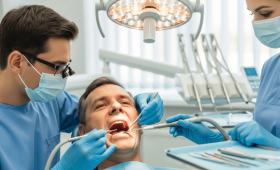This report provides a detailed analysis of dental treatment services in Turkey and Europe, focusing on Euro-based prices and quality standards. The analysis starts with the cost differences for individual procedures and then explores the fundamental economic and structural factors that lead to these discrepancies. Turkey’s dental tourism market offers an average cost advantage of 50 to 70 percent compared to Europe and North America. The primary reasons for this advantage include competitive labor costs, a low-profit margin strategy enabled by a high patient volume, bulk purchasing of dental materials, and intense competition within the sector.
In terms of quality, both regions have their unique strengths. Many clinics in Turkey use modern digital dentistry technologies like CAD/CAM, intraoral scanners, and 3D printing to shorten treatment times and increase precision. Leading Turkish clinics hold international accreditations such as Joint Commission International (JCI) and ISO 9001. In contrast, European countries like Germany ensure more consistent quality assurance through a stricter and more widespread regulatory framework, including qualification equivalency processes for dentists and mandatory quality management systems.
Recent regulations in Turkish health tourism aim to enhance quality and patient safety. New rules, such as mandatory complication insurance and internationally valid accreditation certificates, are significant indicators that the sector is maturing. However, patients must still conduct thorough research when choosing a clinic, verify the credentials of the dentists, and clarify post-treatment follow-up processes in advance.
The report’s findings indicate that Turkey offers a cost-effective and technology-driven treatment option, while Europe stands out with a more structured and risk-mitigating quality assurance system. This analysis aims to provide potential patients with the necessary information to make an informed decision based on their personal priorities.
Introduction: Dental Tourism in Turkey and Europe
Purpose and Scope of the Report
This report comprehensively analyzes the dental treatment services offered in Turkey and Europe from the perspectives of price and quality. In the global health tourism market, dentistry is gaining increasing prominence due to high-cost procedures and aesthetic applications. Turkey is positioned as an attractive destination in this field, while European countries exhibit different price and quality dynamics. This report not only lists the costs but also examines the economic and structural reasons behind these price differences. Furthermore, it comparatively evaluates quality indicators such as clinic and dentist competence, technology used, regulatory standards, and patient experiences. The report aims to provide a framework based on the data obtained to help potential patients, investors, and sector professionals make informed decisions.
A Macro Perspective on the Global Dental Tourism Market
The global dental tourism market reached a value of approximately 6.7 billion dollars in 2022 and is expected to grow at an annual rate of 13.6% to reach a turnover of 24.3 billion dollars by 2032. Turkey stands out as a significant player in this growing market, generating around 300 million dollars in revenue from dental tourism in 2023. This accounts for approximately 15 percent of the country’s total health tourism revenue. Turkey’s main competitors in dental tourism include countries such as Hungary, Croatia, Poland, India, Thailand, and Singapore. High costs and long appointment waiting times in developed countries like the UK, Germany, the Netherlands, and Belgium are key factors driving patients to these markets. This dynamic shows that Turkey competes not only on price but also on accessibility and speed of treatment.
Euro-Based Price Analysis: A Comparative Examination of Dental Treatment Procedures
Price Breakdown in Turkey: Procedures, Brands, and Regional Variations
Dental treatment prices in Turkey offer a significant cost advantage compared to Europe. This is particularly evident in high-cost and complex procedures.
Dental Implants: The price of a single implant varies depending on the brand and clinic. The popular German brand Bego’s implants are priced at an average of 360 Euros, while prices for the Swiss brand Straumann’s implants range from 600 to 700 Euros on average. Some clinics may price Straumann implants at 1000 Euros, while prices for the Israeli-based TAV-Paltop brand may be 550 Euros and for the Swiss-based Tri implants, 700 Euros. The 2024 guide tariff published by the Turkish Dental Association (TDB) states the fee for an intra-osseous implant is 13,975.00 TL (approximately 410 Euros, subject to exchange rate fluctuations). These prices reflect the base cost of labor and the surgical procedure, excluding the material cost.
Veneers and Crowns: Prices for zirconia and porcelain veneers, which are frequently preferred in aesthetic dentistry, are also highly competitive. Prices for zirconia and porcelain dental veneers start from 150 Euros per tooth. Full ceramic crowns are offered at prices starting from 275 Euros per tooth. The prices for laminate veneer applications range from 275 Euros to 500 Euros. A full-mouth set of 20 zirconia veneers can cost around 3500 Euros.
Price Breakdown in Key European Destinations
Dental treatment prices in Europe vary greatly from country to country and even from clinic to clinic. Generally, costs in Western Europe are significantly higher compared to prices in Turkey.
Germany: The cost of a single implant in Germany can range from 900 to 2000 Euros, and this price usually does not include the prosthetic crown fee. With the crown fee added, the total cost can increase by another 600 to 1000 Euros. Prices for zirconia veneers in Germany range from 1000 Euros to 2500 Euros. Even when using the same German-made Vita porcelain material, the price of a single metal-supported porcelain tooth in Germany can range from 300 to 1800 Euros, while the same procedure is done for 150 Euros in some clinics in Turkey.
Hungary and Poland: Eastern European countries offer more competitive prices compared to Western Europe. The average cost for a single dental implant in Hungary is around 450 Euros, with prices ranging from 400 to 500 Euros. However, it is also noted that the general price range for an implant is between 250-1000 Euros. The cost of a porcelain veneer in Hungary is approximately 300 Euros. In Poland, implant prices can be as high as 2500 Euros.
Direct Price Comparison Tables
The following tables highlight the price advantage in Turkey more clearly.
Table 1: Dental Implant Price Comparison (Single Tooth, Euro)
| Brand of Treatment | Turkey Price Range | Germany Price Range | Hungary Price Range |
| Bego | 360 € | – | – |
| Straumann | 600 – 1000 € | – | 640 € |
| General Implant | 360 – 700 € | 900 – 2000 € | 250 – 1000 € |
| Implant + Crown | 700 – 1000 € (est.) | 1500 – 3000 € | 750 – 1300 € (est.) |
Table 2: Crown and Veneer Price Comparison (Single Tooth, Euro)
| Treatment Type | Turkey Price Range | Germany Price Range | France Price Range |
| Ceramic Veneer | 250 € | 1000 € (avg.) | – |
| Zirconium Veneer | 150 – 400 € | 1000 – 2500 € | 850 – 2000 € |
| Laminate Veneer | 275 – 500 € | – | – |
| Porcelain Veneer | 150 € | 300 – 1800 € | – |
Fundamental Economic Reasons for Price Differences
Turkey’s distinct cost advantage in dental treatment is explained by the combination of four main economic factors:
- Competitive and Skilled Labor Force: With a young and dynamic workforce of 32.7 million, Turkey has significantly lower labor costs compared to Western countries. Although dentists’ salaries have increased in recent years, they are still at lower levels compared to their European counterparts. This situation allows clinics to reduce their overall operating costs and pass these savings on to patients.
- Bulk Purchasing Advantage for Dental Materials: Large and organized dental clinics have the power to purchase implants and other dental materials in bulk. These bulk purchases enable them to obtain significant discounts from suppliers. While the same brand of implants is offered at a higher cost in Europe, large clinics in Turkey can use this cost advantage to offer more affordable prices.
- High Demand and Lower Profit Strategy: Dental clinics in Turkey treat many more patients daily compared to clinics in Europe and the USA. This high patient volume allows clinics to maintain a low-profit margin on each procedure. The total profit is derived from high patient demand rather than high per-procedure pricing.
- High Competition: There are numerous dental clinics in Turkey, creating a highly competitive environment in the sector. This competition forces clinics to continuously improve in terms of both price and service quality. This competitive environment also results in more favorable prices and promotions for patients.
The combination of these economic models explains Turkey’s ability to reduce operational costs without compromising on quality and to directly pass these savings on to the patient.
Analysis of Quality Factors: Clinical Excellence and Patient Safety
Professional Competence and Regulatory Standards
The quality of dental treatment is directly related to the competence of dentists and the regulatory standards of the sector. In this context, the quality assurance systems in Turkey and Europe show differences.
Accreditation and Education in Turkey: Dental faculties in Turkey provide education that complies with national and international standards. Many leading dental faculties have received “Full Accreditation” from the Dental Education Programs Accreditation Association (DEPAD). At the clinic level, some organizations hold internationally recognized certifications such as Joint Commission International (JCI) and ISO 9001. There are more than 30 JCI-accredited healthcare institutions across Turkey, a testament to the country’s emphasis on quality.
Quality Assurance in Europe: In countries like Germany, every dental clinic is required to have an in-house Quality Management (QM) system. This system mandates regular audits and improvements in areas such as patient satisfaction, process efficiency, and the standardization of medical procedures. Furthermore, the “equivalency” process for foreign dentists to practice in Germany is very long and difficult, requiring a B2 or C1 level of German language proficiency. These strict auditing and competency processes ensure that the quality of service in Germany has a more consistent and high base. In EU countries like Hungary and Poland, education is conducted through the ECTS (European Credit Transfer and Accumulation System), which is compatible with the Bologna Process, guaranteeing the international validity of degrees and a certain level of educational quality. A clinic in Poland, in addition to its ISO 9001 certification, is among the top 80 in the Global Clinic Rating (GCR), proving it meets international standards.
The Role of Technology in Modern Dentistry
Dental clinics in Turkey closely follow modern technological developments to provide high-quality service to their patients. This leads to faster treatment processes, increased patient comfort, and enhanced precision of the final result.
Digital Dentistry: CAD/CAM (Computer-Aided Design and Computer-Aided Manufacturing) technology forms the foundation of many modern clinics in Turkey. These systems allow for the production of ceramic crowns and veneers in a single session, enabling a bridge to be completed within 24 hours. Intraoral scanners eliminate the discomforts of traditional impression methods, such as gagging, offering a more comfortable experience for patients. The precise digital data obtained ensures high compatibility between restorations and the teeth and gums, thereby reducing laboratory-related errors and the risk of long-term complications.
Impact on Treatment Duration: The use of digital technologies significantly shortens treatment times in Turkey. Complex treatments that might be spread over six months in Europe can be completed in a much shorter period, such as 15 to 30 days, without compromising medical principles. This efficiency not only reduces patients’ time for accommodation and vacation but also makes the treatment process less stressful. This technological investment shows that Turkey competes not only with a price advantage but also with speed and comfort.
Patient Experience and Post-Treatment Care
The success of dental tourism largely depends on the quality of service patients receive and their post-treatment experiences. Patient reviews on online platforms and forums show that these experiences can be quite varied.
Positive Experiences: Many foreign patients state that they are highly satisfied with their dental treatments in Turkey. Some comments emphasize that the quality of treatment was no different from what they would get in their home countries, with the only difference being the price. Patients mention the friendly and caring approach of the dentists, and some even worked for them outside of regular hours. Some patients express that they were able to redesign their smiles during their vacation and achieved natural-looking results.
Risks and Negative Experiences: However, there are also negative comments indicating that not all clinics in the sector meet the same standards. Some patients complain about changing prices during treatment, disrespectful attitudes, or inadequate service. The phenomenon known as “Turkey Teeth” sometimes refers to unnecessarily aggressive and aesthetically problematic treatments. A common risk is that if a procedure goes wrong abroad, a dentist in the patient’s home country may refuse to fix the work. This is because in a world where over 50 different implant systems are used, they may not want to intervene with a system they do not use in their own clinic. Post-treatment care is an area where patients returning to their home countries from Turkey can often face difficulties.
Regulatory Frameworks and Market Dynamics
New Regulations in Turkish Health Tourism (2025)
The Turkish government has made significant regulatory changes in 2025 to maximize the potential of the health tourism market and increase patient safety. These regulations aim to strengthen the sector’s quality perception and operational standards.
Main Changes:
- 5-Year Experience Requirement Removed: The previous regulation required doctors to have at least five years of experience to provide health tourism services. This requirement has been removed, allowing young doctors with a YÖK-approved diploma to integrate into the sector more quickly, thereby increasing capacity.
- Mandatory Complication Insurance: Mandatory complication insurance has been introduced for surgical and interventional procedures within the scope of health tourism. This requires insurance coverage for the patient in case of an unforeseen negative outcome.
- Mandatory Accreditation and Certification: Health facilities are now required to have internationally valid accreditation and certificates issued by the Turkish Health Services Quality and Accreditation Institute (TÜSKA). This ensures that the quality of service is documented according to national and international standards.
- Integration with the HealthTürkiye Portal: All health facilities must be integrated with the Ministry of Health’s “HealthTürkiye” portal. This portal allows patients to view services and accredited institutions.
These regulations aim to prevent unethical practices and unauthorized clinics in the sector and have the potential to enhance Turkey’s reputation and reliability in dental tourism in the long run.
Market Competition and Strategic Positioning
Turkey’s dental tourism market stands out not only with its cost advantage but also with the additional services it offers. Many clinics provide “all-inclusive” packages that include services like airport transfers and accommodation, making the process more comfortable and attractive for patients. This strategy combines healthcare services with a tourism experience. Tourist cities such as Istanbul, Antalya, and Kuşadası are popular locations for such packages.
Economic Contribution and Future Outlook of Dental Tourism
Dental tourism makes significant contributions to the Turkish economy and creates important opportunities for related sectors such as hotels, transportation, and tourism. The future of the sector looks bright, but issues such as unauthorized clinics and foreign-national dentists without work permits pose a risk of lowering quality and endangering patient health. The new regulations have the potential to mitigate these risks and ensure the sector’s more sustainable growth.
Synthesis and Recommendations
A Framework for Balancing Price and Quality
Dental treatment in Turkey has become a global attraction with its affordable prices and use of modern technology. However, this appeal does not always guarantee quality. While Turkey has the potential to combine high technology and qualified dentists with low costs, Europe offers more consistent quality assurance through its more widespread and strict regulatory systems. This creates a need for patients to find a balance. A patient considering treatment in Turkey should weigh the cost advantage against potential risks such as possible follow-up difficulties, language barriers, and problems with the local legal system.
What matters is not focusing on low prices but finding a correct and reliable clinic. The most crucial step is to carefully research the dentist’s expertise, the clinic’s accreditation documents, and the details of the treatment plan.
Strategic Recommendations
In light of this analysis, strategic recommendations can be developed for different stakeholders:
- For Patients:
- Conduct Comprehensive Research: Check potential clinics for international accreditations (JCI, ISO). Read other patients’ reviews and pay special attention to experiences regarding follow-up processes.
- Clarify the Process: Before starting treatment, request a written treatment plan that includes all procedures, materials to be used, extra fees, and possible warranty conditions.
- Follow-up Plan: Inquire about whether a follow-up plan exists for potential problems after treatment, its cost, and how it works. Consult your own dentist beforehand to understand the possible risks of the treatment and what kind of intervention you can receive in your home country.
- For Clinics in Turkey:
- Compliance with Regulations: Ensure full compliance with the 2025 regulations to increase patient safety and corporate reputation. Use the mandatory complication insurance and TÜSKA accreditation as a competitive advantage.
- Transparency and Communication: Provide full transparency on pricing, warranties, and treatment plans. Establish multilingual patient services and 24/7 communication channels to gain the trust of international patients.
- For European Dentists:
- Highlight Local Advantages: Counter high costs by emphasizing advantages such as local regulatory oversight, easy follow-up options, and the absence of language and cultural barriers. Explain the long-term benefits of receiving treatment from a trusted source close to home.
Rethink Your Smile: Combining Best Prices and Top Quality with Cure Holiday
Deciding on the right dental treatment is a significant choice that directly impacts both your budget and your health. In Europe, high costs and long waiting times push many people to seek alternatives. This is where Turkey’s exceptional balance of price and quality comes into play. At “Cure Holiday,” we’re here to turn these advantages into a superior patient experience.
Price and Quality Analysis: Why Turkey? Why Cure Holiday?
1. Price Advantage Up to 70% Compared to Europe
Our research shows that dental treatments in Turkey, especially common procedures like dental implants, zirconium crowns, and porcelain veneers, are between 50% and 70% more affordable than their counterparts in Europe. The main reasons for this cost difference are lower labor costs, bulk material purchases due to high patient volume, and general economic conditions. At Cure Holiday, we pass this cost advantage directly on to you, allowing you to achieve the smile of your dreams without straining your budget.
| Treatment | Average Price in Turkey (EUR) | Average Price in Germany (EUR) | Average Price in Hungary (EUR) |
| Single Tooth Implant | 450 – 750 € | 1,800 – 3,500 € | 900 – 1,500 € |
| Zirconium Crown | 180 – 250 € | 400 – 800 € | 250 – 400 € |
| Porcelain Veneer | 200 – 300 € | 500 – 1,000 € | 300 – 600 € |
2. International Standards of Quality and Assurance
In dental tourism, quality is just as important as price. At Cure Holiday, we collaborate with modern clinics that are equipped with the latest technology and hold international quality management certifications such as ISO 9001. Our clinics work with experienced dentists who specialize in everything from implantology to cosmetic dentistry and have received international training. All the materials we use are high-quality, globally recognized brands like Straumann and Nobel Biocare.
Technological Equipment: We use standard technologies like CAD/CAM systems, digital scanners, and 3D imaging to increase the speed and accuracy of the treatment process. This shortens your treatment time and ensures the results are achieved with the highest precision.
Legal Assurance: With the new regulations from the Turkish Ministry of Health coming into effect in 2025, all clinics providing health tourism services will be required to have complication insurance and certain accreditations. At Cure Holiday, we are already adopting these new standards to provide you with complete peace of mind.
3. A Flawless Treatment and Holiday Experience
Working with us isn’t just about planning a dental treatment; it’s about experiencing a personalized travel and accommodation plan. We personally handle every detail, from airport transfers to your accommodation, and from post-treatment check-ups to language support. During your treatment, you can discover the natural beauty and historical richness of Kuşadası, turning the process into a comfortable and enjoyable holiday.
Take the First Step Towards Your Dream Smile
At Cure Holiday, our goal is to offer the highest quality dental treatment at the most affordable prices, all while giving you an unforgettable experience. We’re here to create a custom treatment plan for you and answer all your questions. Contact us today for a free consultation to find out how you can achieve the smile of your dreams.



